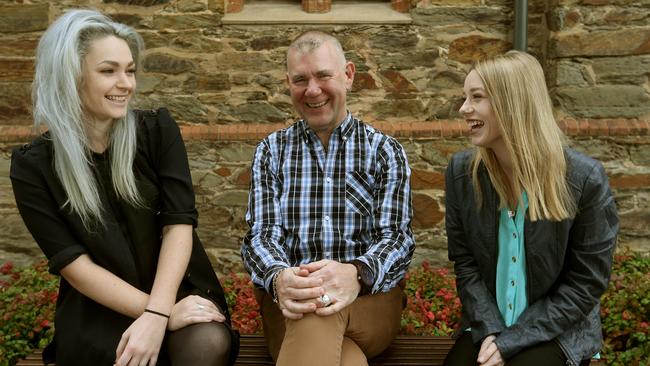Aged care Get Into pilot program aimed at the young unemployed
A pilot program is proving the aged-care sector is not just about nursing jobs in old-folks homes.

The creators of a pilot program encouraging young unemployed people to work in aged-care services — including administration, maintenance and personal care — hope it will change the stereotypical image of an industry aimed at older workers.
The Get Into pilot program — funded by not-for-profit SYC and the British-based Prince’s Trust International, established in 1976 by the Prince of Wales to help disadvantaged youth — involves four weeks of training for four youths aged 18 to 25 in four employment areas.
SYC chief executive Paul Edginton says the courses in social care, childcare, retail and traffic management have resulted in several dozen job offers, particularly for the long-term unemployed.
“The average amount of time participants haven’t worked is 74 weeks, which is a year and a half, and half of them will have jobs after four weeks,” Edginton says. “It gives you the idea of how a social training program like this is helping people get into jobs.”
The program has involved unemployed people registered with SYC taking part in the courses, including on-the-job training, with guarantees of up to half of each group gaining roles with sponsoring organisations.
The training has provided the long-term unemployed with opportunities in a market where youth unemployment is high, Edginton says, and has failed to recover since freefalling in 2008.
April labour force figures show youth unemployment has risen to 13 per cent among 15 to 24-year-olds, and 15.5 per cent in Adelaide where the pilot program is based.
“What happened with youth unemployment during the global financial crisis hasn’t turned around,” Edginton says. “Teenage unemployment went through the roof in 2008 and it stayed there. These programs are showing they can get value from having youth employment programs.”
Traditional youth employment has changed since the 1980s, Edginton says, with fewer jobs in manufacturing and trades and a boom in service industries.
“In 1986, 30 per cent of young people went into the services industries; in 2016 it’s 70 per cent. It’s a massive blowout,” he says.
As the population ages and the National Disability Insurance Scheme grows, there will be a need for more workers in allied healthcare and related services.
ECH, a housing provider for the aged who want to stay in their homes, offers services from social activities to maintenance, gardening, meal help and personal care. It has been partnering with the Get Into social care program and will take on at least seven workers at the end of the pilot. The group has employed an extra 120 people in the past 18 months and is looking for another 100 in the next year.
ECH chief executive David Panter says the roles are varied, including garden and maintenance, administration and personal care, reflecting the varied nature of the aged-care industry, and differ from the stereotypical view of nurses working in a home for the elderly. “We have people who work in our wellness centres that provide gyms and community activities. The more we can keep people physically fit the more likely they are to be well,” Panter says.
“We want to introduce to younger people that aged care isn’t about nursing homes.”
ECH staff in various service areas mentor participants. Those who are offered jobs will also receive further training.
“We want to find they have the aptitude to work with older people,” Panter says.
The program has caught some young people by surprise because they had not considered career pathways in aged care could include garden or home maintenance. As a result, many have learned new skills.
Prince’s Trust chief executive Jonathan Townsend says the program has supported 35,000 young people in Britain and it is pleasing to see its Australian expansion. SYC wants to expand the program after the pilot ends this month, subject to additional partners and job providers being found.
***
Young workers find fulfilment in the aged-care sector
Kira Bishop’s desire to communicate with dementia sufferers arose after witnessing her grandmother grapple with the brain disease.
“It was very full-on looking at her,” Bishop says.
“I wanted to be able to go into that life … and learn those (communication) skills.”
Participating in SYC’s Get Into Social Care program, Bishop, 18, is training in the aged-care sector in the hope of gaining long-term employment helping people like her grandmother.
Bishop is not only pursuing something close to her heart, but also attempting to beat South Australia’s high youth unemployment rate by landing employment in a highly specialised sector.
However, she is most appreciative of the new interpersonal skills she is acquiring, making her a better person. As part of her work experience, Bishop is assisting in running social programs that provide people with respite.
“I definitely take a lot more initiative and understand people better,” she says.
Molly Hill, 24, has slightly different reasons for undertaking the program. Hill’s frustration with the nature of the hospitality industry led her to branch off into aged care.
“The amount of work just isn’t out there in hospitality,” Hill says.
“There are so many young kids looking for work in hospitality, and unfortunately they see you as expendable. It’s a tough gig keeping a job in hospitality nowadays.”
Originally from Booleroo Centre in the Southern Flinders Ranges, Hill arrived in Adelaide in 2011 to study information technology and digital design, but realised tertiary study “wasn’t for her”.
She has since struggled to find stable employment and is looking for a “nine to five job”.
Unlike Bishop, Hill wants a job in aged care administration.
“It’s at that time in my life where I should be finding something more stable and better financially.”
GABRIEL POLYCHRONIS


